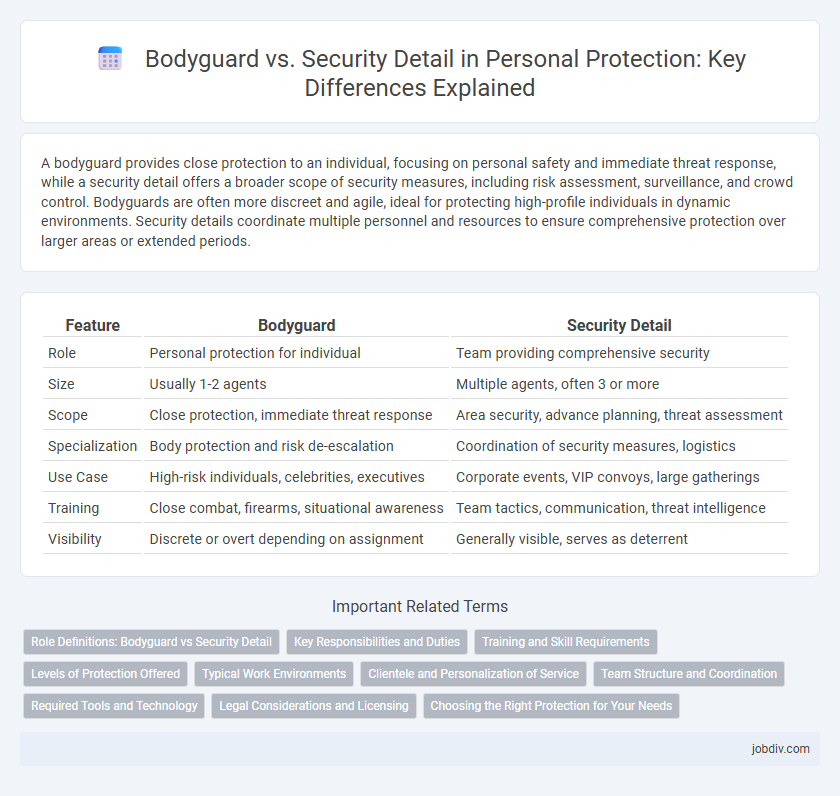A bodyguard provides close protection to an individual, focusing on personal safety and immediate threat response, while a security detail offers a broader scope of security measures, including risk assessment, surveillance, and crowd control. Bodyguards are often more discreet and agile, ideal for protecting high-profile individuals in dynamic environments. Security details coordinate multiple personnel and resources to ensure comprehensive protection over larger areas or extended periods.
Table of Comparison
| Feature | Bodyguard | Security Detail |
|---|---|---|
| Role | Personal protection for individual | Team providing comprehensive security |
| Size | Usually 1-2 agents | Multiple agents, often 3 or more |
| Scope | Close protection, immediate threat response | Area security, advance planning, threat assessment |
| Specialization | Body protection and risk de-escalation | Coordination of security measures, logistics |
| Use Case | High-risk individuals, celebrities, executives | Corporate events, VIP convoys, large gatherings |
| Training | Close combat, firearms, situational awareness | Team tactics, communication, threat intelligence |
| Visibility | Discrete or overt depending on assignment | Generally visible, serves as deterrent |
Role Definitions: Bodyguard vs Security Detail
A bodyguard provides close protection to a single individual, focusing on personal safety and immediate threat prevention through constant physical presence. Security detail involves a coordinated team responsible for securing a broader area, managing access points, and mitigating risks for high-profile individuals or groups. The primary distinction lies in the bodyguard's role as a personal protector versus the security detail's comprehensive operational security management.
Key Responsibilities and Duties
Bodyguards primarily focus on close protection, ensuring the personal safety of clients through constant physical presence and immediate threat response. Security details encompass broader responsibilities, including risk assessment, securing perimeters, coordinating with law enforcement, and managing security protocols for events or locations. Both roles require vigilance, tactical awareness, and rapid decision-making to mitigate risks and protect individuals effectively.
Training and Skill Requirements
Bodyguards require specialized close-protection training emphasizing threat assessment, evasive driving, and unarmed combat techniques tailored for individual security. Security details demand broader skills including coordination, crowd control, and tactical communication to manage multiple protectees and complex environments. Both roles necessitate physical fitness, situational awareness, and proficiency in defensive tactics, but bodyguards focus more intensely on personalized threat mitigation.
Levels of Protection Offered
A bodyguard typically provides close protection for a single individual, focusing on immediate physical safety and quick threat response. Security details encompass a broader scope, including multiple personnel tasked with comprehensive protection strategies such as surveillance, access control, and threat assessment. The level of protection offered by security details is generally more extensive, integrating both proactive and reactive measures to ensure overall safety.
Typical Work Environments
Bodyguards primarily operate in close personal protection settings such as private residences, public events, and travel scenarios, ensuring the safety of individuals in intimate or immediate surroundings. Security details manage broader environments including corporate offices, government buildings, and large gatherings, where comprehensive area security and threat assessment are critical. Both roles require situational awareness, but bodyguards focus on proximity protection while security details emphasize perimeter control and coordinated security operations.
Clientele and Personalization of Service
Bodyguards offer highly personalized protection often tailored to high-profile individuals, celebrities, or executives who require close physical security and discretion in varied environments. Security details, typically deployed for larger groups or corporate settings, provide comprehensive risk management with multiple personnel covering broader areas and potential threats. Clientele choosing bodyguards prioritize one-on-one attention and customized security protocols, while those opting for security details seek scalable protection aligned with complex operational needs.
Team Structure and Coordination
A bodyguard typically operates individually, providing personalized protection and quick response to immediate threats, while a security detail functions as a coordinated team with assigned roles to cover all angles of protection. Security details include drivers, advance scouts, and communications specialists, ensuring seamless teamwork and real-time information sharing. This structured approach enhances threat detection, strategic movement, and emergency evacuation efficiency, offering comprehensive security beyond personal defense.
Required Tools and Technology
Bodyguards primarily rely on personal defensive tools such as discreet communication devices, bulletproof vests, and non-lethal weapons like pepper spray or tasers to ensure individual protection. Security details incorporate advanced technology including surveillance systems, GPS tracking, and access control mechanisms to manage the safety of larger groups or high-profile events. Both utilize encrypted communication platforms and situational awareness software to coordinate real-time responses and maintain optimal security coverage.
Legal Considerations and Licensing
Bodyguards and security details operate under distinct legal frameworks, with bodyguards often requiring specialized personal protection licenses depending on jurisdiction. Security details typically work under broader security service licenses, regulated by national or state security agencies to ensure compliance with safety standards. Understanding these licensing requirements is crucial to guaranteeing lawful operation and effective personal protection.
Choosing the Right Protection for Your Needs
Selecting between a bodyguard and a security detail depends on the specific level of threat and personal preferences for protection. A bodyguard offers close, personalized defense ideal for high-profile individuals requiring constant vigilance. Security details provide a broader protective presence, suitable for events or environments where multiple layers of security are necessary to manage diverse risks effectively.
Bodyguard vs Security Detail Infographic

 jobdiv.com
jobdiv.com